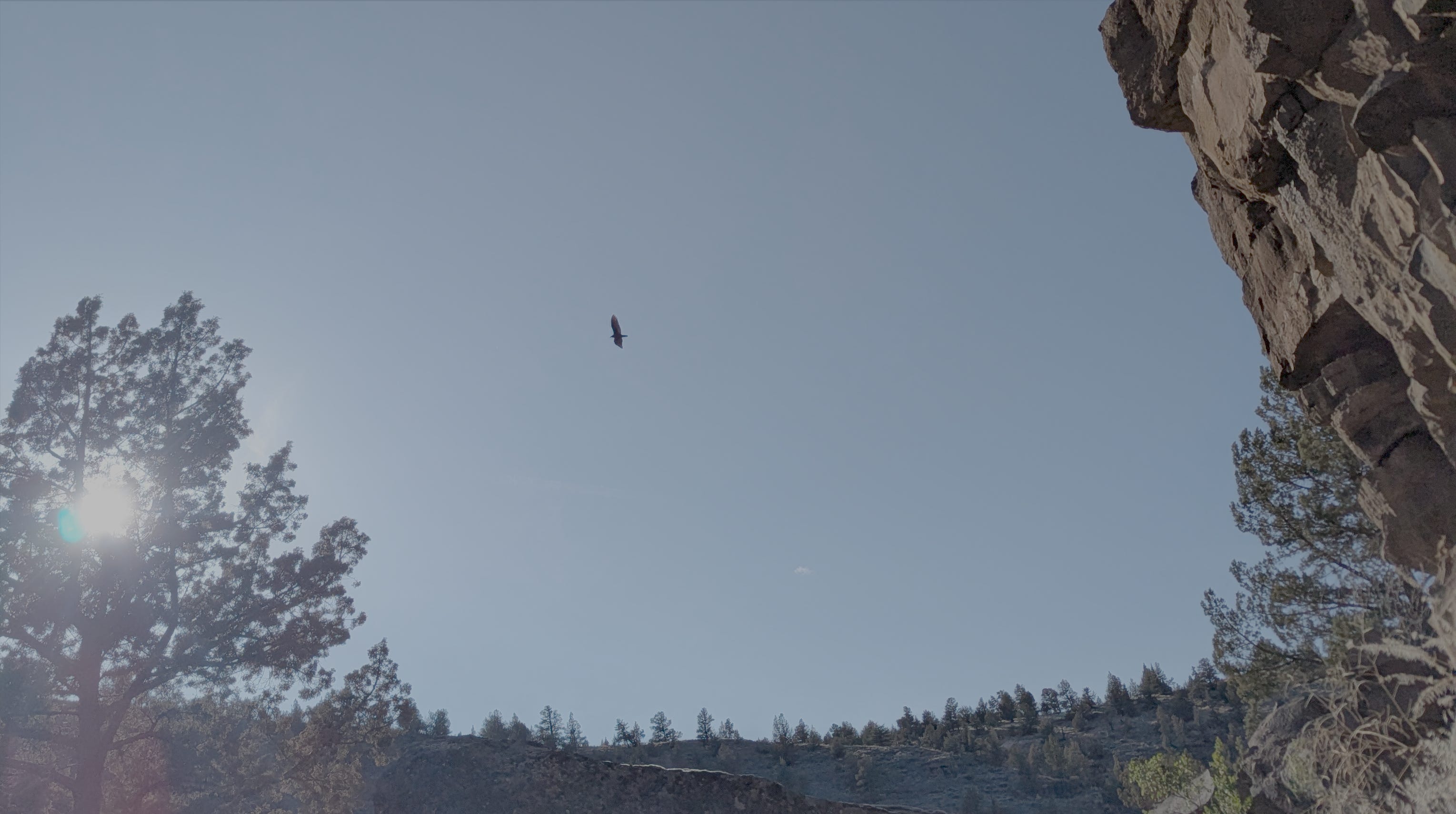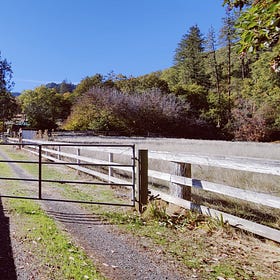After Sara Ramsay of Rural Magic
The vultures are back here in Central Oregon, too. The day before I read Sara Ramsay’s The Case for Optimism1 one came low across the meadow.
Like Sara, I have been back in my homeland for three years after an adult life in cities. I know that these massive, unloved birds are a mark of Spring.

The peaks are covered in snow still, but a vulture’s arrival tells me that my acre is going to need more of me soon. I will be finding time for weeding and watering. I will pile last year’s leaves, cut back dead plant ends. Pare down the marionberry canes.
In her essay, Sara calls out the choices other than optimism in this season we share:
I would argue that we have reached this point because the collective consciousness has been steeped, at least since the Vietnam era, in a toxic stew of pessimism, nihilism, fatalism, and even idealism. Pessimism believes the worst about each other; nihilism wants to destroy everything and start again; fatalism believes we deserve it; and idealism ignores reality in favor of emotional or spiritual transcendence.
Sara and I are cast in similar places — our rural, conservative homelands — watching the same birds, mulling at the choice our culture has made. In my thinking I see America share another dark and destructive armor to adorn: cynicism.
We lift up cynical comedy, cynical analysis, cynical advice to the young. It is neither an accurate view of the world nor a reflection of intelligence.2 It speaks of frustration, disappointment, heartbreak.
Defeatists and cynics populate the voting blocs of both the left and the right. Now, on the left, cynicism feels like it gets to complete its lifecycle by saying “I told you so” to any optimist it comes across. Cynicism is our self-inflicted folk treatment for a broken heart, a brutal series of bloodletting sessions in social posts and off-hand statements that sound authoritative. Cynicism collects “data” with no research behind them but confirmation induced by an uninspected algorithm run by someone making money off of us.
I believe the broken heart of cynicism comes from a disappointment that we have not “evolved.” That “we should be over this.”
I am optimistic because I never expected us to evolve. We don’t get over anything for more than a generation’s memory. In my model of the universe, the potential for fascism will always be within the human mind. It helps me understand cynicism on both sides of our political interchange; thinking that we could “breed it out” of us and seeing that we instead keep turning to the same habits breaks the heart.
So many are dealing with heartbreak in America right now. Then there are those that are celebrating. I am nearby to some of them. I have to fit them into my sense-making. I went over to a neighbor’s for coffee. Fox news was talking about Zelensky. He paused it and we chatted about sourdough, firewood, family.
He and his wife are of my mom’s generation. Unlike my mom, they used to get around. “Oh we do miss the 86 Corral,” he said.
That was the western bar here when I grew up. The 86 was two blocks away from The Big O diner. The Big O was open all night. Coffee was 70 cents for bottomless when I was in high school. All you can eat biscuits and gravy were $1.99. That does not sound right. Maybe it was $4.99.
At 2:30am The 86 closed. Those who had the sense to realize that they were too drunk to drive came over to The Big O. The smoking section was skater hippy goth kids and drunk ranch hands. It seems likely that in the early 90s My neighbor and his wife and I were all in there together.
My neighbor and I despair sometimes. We return to the places, people, and knowledge that keeps us going. Neither of us like seeing Redmond change so much as it is. But we both have Kirkland brands in our pantry, the delights of big box shopping.
In Sara’s article, she tells us a little about the farm crisis of the 80s. I don’t know much about that other than Farm Aid. At about the same time her town’s heart was breaking, Oregon was going through its own economic trauma around timber.
You can’t put the story simply, but to move my case for optimism forward; Modern Oregon was built on a few generations of the timber industry. In the 80s it was failing. International investors were moving mill operations overseas. In a lucky convenience for the mill owners, environmental research revealed that some (not all) forest practices were crashing particular ecosystems.3
The famous ecology-vs-economics clash over the the spotted owl (do check out the Timbers Wars podcast in the previous footnote) covered for the closing of the mills that the owners wanted to do anyway.
Ever since humans started building mills and factories, they have closed those factories in the name of profits elsewhere. It is hard to write an original take on how that scars working people.
In the face of that old tale, Oregon did what places do. It tore into itself. I chose a side; I was an environmentally-minded kid. I wanted to save the spotted owl. What was economics when weighed against the natural systems that support life?
But my high school friends smoking with me at The Big O had unemployed dads. That heartbreak was a constant in our lives. The drunks from the 86 were worried and angry. Forces external to us were jacking our lives up. We did not have a lot of knobs to turn. We smoked and swiped at each other. We came back the next week to do it again.
just a few years before, you could graduate from Redmond High School (or not) and get a job in town. I believe there were three mills here and more in each adjoining town. There were logging operations looking for workers. You could work downtown at the hardware store or the lumber yard. There was a pretty straightforward path to a life here. Same was true in just about any Oregon small town.
The owners of those mills already knew that they were going to yank it all away, but an RHS graduate in 1980 would have gone into that mill job anyway.
Then the jobs went poof. Just like the farms in Iowa.
It sounds like Sara’s town in Iowa never found a way back to growth. Redmond did. My mom and other community believers wore buttons that read PERC: Positive Enthusiastic Redmond Citizens. She told me recently, “it was hard to find things to be positive about, though.”
Something in the town’s efforts and the winds of fortune worked out here. After a couple decades in economic wilderness, Redmond now blends recreation and small-scale manufacturing. You might be able to stay and raise a family working at BasX, Medline, or Eagle Crest Resort. You can’t work at the hardware store or lumber yard downtown; those are gone. Like most of America, we get our pre-hung doors and drill indexes at the Lowe’s or the Home Depot. These two big boxes bracket the town on Highway 97. Costco, purveyor of those Kirkland brands, is 20 minutes away.
Along 97, close-in farmland is turning into houses. They are rather close together for my mother’s taste. Redmond is doing pretty well, but it is not the same. It won’t be the same.
We have grief, too, Sara. We don’t carry it so healthy, either. There is not much to do about that. When I shout at urban liberals and Subarurals4 to understand or maybe support some policy that favors rural Oregon, I don’t believe that it will be the keystone in some bridge we all cross together. Some grief will abate. Some will continue to ferment into rage.
And that is why I am optimistic.
Wait: what?
I am optimistic because this is just as we have always been. This is humans humaning. That the ugly birds coast across the sky, over our heads and over this land. That the snow pack is discussed. That we continue to be both fireballs of destruction and a good neighbor welcoming you over for coffee.
We all came back to The Big O. My neighbor turns off Fox News to catch up with liberal me. The Democratic-voting Christian couple on the other side of his property takes his dog along when they walk their own pups.
I am optimistic because I have had a rich life with my own bubbling human spirit in community with other bubbling human spirits. As corporations gutted communities like Sara’s and mine, as hate of others has brought violence to neighbors, I have learned to watch for vultures in March and be glad for their grotesque presence.
The Cynical Genius Illusion: Exploring and Debunking Lay Beliefs About Cynicism and Competence by Olga Stavrova1 and Daniel Ehlebracht https://journals.sagepub.com/doi/pdf/10.1177/0146167218783195
For a thorough reporting of Oregon’s Timber story that is compassionate to the people on all sides, check out Oregon Public Broadcasting’s stellar Timber Wars podcast https://www.opb.org/show/timberwars/.







Vultures are beautiful, majestic, and their flight is more sensual than a Bald Eagle, but not as sexy as a Golden Eagle, endangered because we cut and build and grow, though I have seen two up here; only bird who can take out a wolverine.
Another great case for optimism is Hans Rosling’s Factfulness. Turns out the world is steadily getting better if you look at the facts!